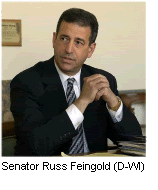Feingold Pushes Again For Iraq Troop Withdrawal
 Senator Russ Feingold (D-WI), who has long been an advocate of withdrawing our troops from Iraq, while focusing on al Qaeda and real terror threats to America, continued his leadership role yesterday when he introduced legislation requiring a withdrawal of most U.S. troops from Iraq by the middle of 2007.
Senator Russ Feingold (D-WI), who has long been an advocate of withdrawing our troops from Iraq, while focusing on al Qaeda and real terror threats to America, continued his leadership role yesterday when he introduced legislation requiring a withdrawal of most U.S. troops from Iraq by the middle of 2007.“Redeploying our troops will pressure the Iraqi government to get its political house in order while allowing us to re-focus on global terrorist organizations and trouble spots that threaten our national security,” Feingold said. “It simply doesn't make sense to continue devoting so much of our resources to one country while ignoring the growing threats we face around the world.”
Part of the "growing threat" that Feingold has continually cited, is the presence of al Qaeda operatives in more countries now than when the United States was attacked on September 11, 2001 -- so much for the success of George W. Bush's bogus "war on terror" huh?
Feingold's legislation, which builds on an amendment he authored earlier this year, allows for a small number of U.S. troops to remain in Iraq for targeted counter-terrorism activities, training of Iraqi security forces, and the protection of U.S. infrastructure and personnel. The bill has been referred to the Senate Foreign Relations Committee.
The Wisconsin Senator, who recently ended speculation that he would run for president in 2008 by announcing his decision to not pursue the Democratic nomination, was the first U.S. Senator to propose a target date for the redeployment of U.S. troops from Iraq.
Earlier this year, Feingold cosponsored an amendment to the Defense authorization bill that would have required the redeployment of U.S. troops from Iraq by July 1, 2007. In September, Feingold also introduced a resolution addressing the need to strengthen our efforts in Afghanistan to prevent that country from again becoming a key staging ground for terrorists.
“I supported the decision to go to war in Afghanistan, but this administration took its eye off the ball by focusing on Iraq. Unless we ramp up our efforts in Afghanistan, we risk leaving behind a weak government susceptible to the kind of extremism responsible for the attacks on our country on 9/11,” Feingold said in September. “Afghanistan could be a major victory in the international fight against terrorist networks, but only if we are willing to give it the attention and resources it demands.”
When you witness how things have indeed been going into the toilet in Afghanistan -- and the reemergence of the Taliban we supposedly got rid of -- you see that with this, and many things dealing with national security, Feingold has been ahead of the curve in the Democratic party and remarkably better suited for a leadership role in this area than anyone in the Bush administration.
It is also undeniable that what Feingold said about the situation in Iraq in early 2006 is even more true today, than it was then: "Our current path is unsustainable,” Feingold said in April. “While this amendment recognizes the need for certain U.S. forces to be engaged in counter-terrorism activities, the training of Iraqi security services, and the protection of essential U.S. infrastructure, it also recognizes that the President’s current strategy in Iraq is undermining our nation’s national security.”
And what Feingold wrote in an October 29 Milwaukee Journal Sentinel editorial puts a sharp point on why we need to stop having our people killed for nothing in Iraq, while also citing our lack of attention elsewhere.
"If we remain bogged down in Iraq, a country that had nothing to do with 9-11, we will be incapable of addressing the terrorist networks that have developed new capabilities and found new sources of support throughout the world."
The voters spoke loud and clear on November 7 about the current course in Iraq -- let's see how many of Feingold's Senate colleagues listened.

















<< Home